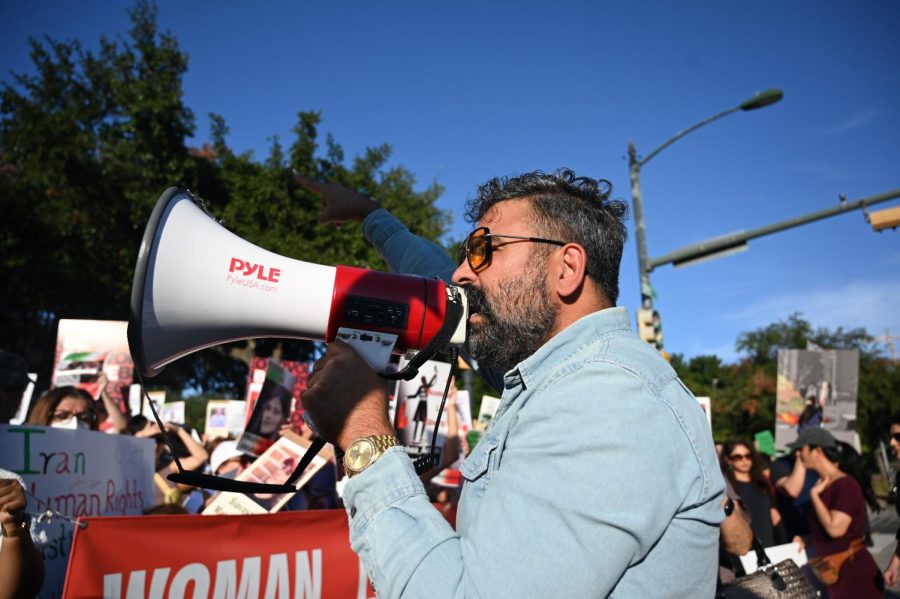Austin community unites, brings attention to death of Iranian woman Mahsa Amini
Fared Shafinury leads the crowd in chant in front of the Texas State Capitol on Sept. 26, 2022. Protestors gathered in protest of the Iranian government following Mahsa Amini’s death.
September 30, 2022
“Zan, zendegi, azadi!” protestors chanted in Persian. “Woman, life, freedom!” they continued, alternating between English and their native tongue.
On Monday, protestors flooded the streets around the Texas Capitol in solidarity for Mahsa Amini. Protestors held up a variation of the flag of Iran, emblazoned with a bright yellow sun and lion used to represent one of the oppositions to the current political regime, as they repeated Amini’s name.
Mahsa Amini, a young woman from Saqez — a Kurdish city within Iran — was held in police custody by the Gasht-e Ershad, or religious morality police, for breaking hijab rules in Tehran on Sept. 13, according to various sources. After being detained and beaten, Amini fell into a coma for three days and subsequently passed away at 22.
“It’s not about fighting against the religion,” said one protestor, who wished to remain anonymous in order to protect themselves from the Iranian state. “It is a fight against the government.”
The current Iranian regime denied beating Amini and claimed that she had passed away due to bad health.
“They killed my son in cold blood, and we are standing for (Amini’s) blood all over Iran and all over the world,” protestor Sanaz Zarifian said. “We are standing for every drop of their blood.”
At the protest, a woman held a stick with strands of hair attached, a symbol of Amini’s hair that was used to justify her detainment by Iranian religious police.
Amini’s death sparked a number of protests throughout Iran and across the globe.
Ongoing protests in Iran have caused the government to retaliate with tear gas and ammunition, contributing to a growing death toll of over 80 individuals. On Sept. 21, Iran cut off internet access for citizens amid the protests.
Zarifian and other protestors said they were frustrated with the inability to contact their family members in Iran during such a tense political climate.
One Persian UT systems employee, who wished to remain anonymous, said this was the first time in many years that everyone from the Iranian opposition had joined forces against the current regime.
“The opposition group against the Iranian regime is really not united. … They’ve had their own agendas. But this cause is very broad and everyone can agree it’s basic human rights,” the employee said. “We don’t want an Islamic Republic. We just want Iran — with no other words behind it.”
Farshid Hariri, a former U.S. military member of Persian descent, said he joined the U.S. military to fight against the Iranian government. Hariri said he and his wife chose to protest to bring attention to women’s rights in Iran, along with their disapproval of the current regime as a whole.
“It’s gonna be a little radical for me to say this, but nothing comes free,” Hariri said. “We have to fight for it. If it means killing and being killed, then that’s fine.”
Currently, UT’s Counseling and Mental Health Center is running discussions to support Iranian students through chai and yoga sessions with Geeti Shirazi Mahajan, a clinical social worker and integrated health therapist.
Mahajan said this is the first time a lot of Persian students are being vocal about this cause, and support is necessary.
“Based on what the Persian students are sharing with me, one of the things that’s really important for them is just to be checked in with,” Mahajan said. “Right now, just acknowledging that they may not know exactly what their needs are but having that care and compassion extended to them is something that goes a really long way.”












